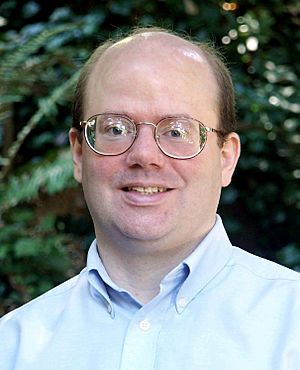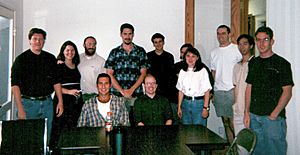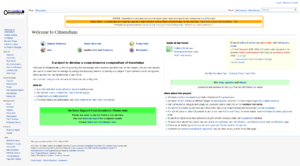Larry Sanger facts for kids
Quick facts for kids
Larry Sanger
|
|
|---|---|

Sanger in 2006
|
|
| Born |
Lawrence Mark Sanger
July 16, 1968 Bellevue, Washington, U.S.
|
| Education |
|
| Occupation | Internet project developer Philosopher |
| Known for |
|
| Children | 2 |
| Signature | |
 |
|
Larry Sanger, born on July 16, 1968, is an American who helps create online projects and is also a philosopher. He is famous for co-founding Wikipedia with Jimmy Wales. Larry Sanger also came up with the name "Wikipedia." He helped write some of Wikipedia's first rules, like "Neutral point of view" (meaning fair and unbiased) and "Ignore all rules" (meaning sometimes it's okay to break rules if it helps the project).
Before Wikipedia, he was the main editor for Nupedia, which was another online encyclopedia. Nupedia was like an older version of Wikipedia. After Wikipedia, he worked on other encyclopedia projects such as Encyclopedia of Earth, Citizendium, and Everipedia. He also gave advice to Ballotpedia, which is a non-profit online encyclopedia about American politics.
Contents
Larry Sanger's Early Life and School
Larry Sanger was born in Bellevue, Washington, on July 16, 1968. His dad, Gerry, was a marine biologist who studied seabirds. His mom stayed home to raise the children. When Larry was seven, his family moved to Anchorage, Alaska, where he grew up. He became interested in philosophy at a young age. By the time he was 16, he decided he wanted to study philosophy for his whole life.
In high school, he joined the debate team. Larry says that debating helped him understand the idea of being neutral. It showed him how to look at different issues and arguments from all sides. He learned that it was important to present both sides fairly.
After high school in 1986, Larry Sanger went to Reed College. He studied philosophy there. In college, he became very interested in the Internet. He saw it as a great way to share information. He even set up an online group for students and tutors to connect. This group was also a place to talk about teaching methods. He also started a discussion group about libertarian philosophy.
Larry Sanger earned his first degree in philosophy from Reed College in 1991. He then got a Master's degree from Ohio State University in 1995. He finished his Doctor of Philosophy degree from Ohio State University in 2000.
Nupedia and Wikipedia
Nupedia was an online encyclopedia. It was created by Jimmy Wales and supported by his company, Bomis. Volunteer writers who were experts in their fields wrote articles for Nupedia. Editors then reviewed these articles before they were published.
In January 2000, Larry Sanger joined Nupedia as its main editor. He started working on Nupedia in February 2000. He created a system for reviewing articles and found editors to help. Larry found it "fascinating" to organize people online to create encyclopedias.
However, Nupedia was very slow to grow. By the end of 2000, it was not making much progress. Larry Sanger said that the process they used for making articles was "very slow."
How Wikipedia Started
In January 2001, Larry Sanger suggested using a wiki to make articles faster. A wiki is a website that lets many people easily add and change content. This idea led to the creation of Wikipedia, which launched on January 15, 2001.
Wikipedia was first meant to be a place where the public could write articles. These articles would then be reviewed and added to Nupedia. But most of Nupedia's experts did not like the idea of Wikipedia. They thought it was silly.
The idea for using a wiki came to Larry Sanger when he had dinner with his friend Ben Kovitz on January 2, 2001. Ben Kovitz was a computer programmer who knew about Ward Cunningham's Wiki. Larry was very impressed with wikis. He called Jimmy Wales, who agreed to try it. Larry Sanger came up with the name "Wikipedia." He chose it from a long list of names.
Larry Sanger created Wikipedia's first pages and invited the first people to contribute. Within a few days, Wikipedia grew very quickly. It became bigger than Nupedia. Larry Sanger was Wikipedia's "chief organizer." He invited new writers and helped write the first rules. These rules included "Ignore all rules", "Neutral point of view", "No original research", and "Verifiability". He also created the idea of "Brilliant prose," which later became "featured articles." These are Wikipedia's best articles.
Leaving Wikipedia
Larry Sanger became less happy with Wikipedia by mid-2001. He felt that the community was being taken over by people who did not respect authority. He had disagreements with other editors who did not like his way of organizing things. Larry suggested that expert editors should have more authority to solve problems and make sure rules were followed.
Larry Sanger was the only paid editor for Wikipedia. In early 2002, the company Bomis considered putting ads on Wikipedia to pay for Larry's job. But the Wikipedia community did not want ads. Larry Sanger was laid off in February 2002. He then left his roles at Nupedia and Wikipedia on March 1. He said he left because he could not do the work as a part-timer. He was also tired of the arguments.
Larry Sanger tried to keep Nupedia going in 2002. He looked for another organization to take it over. However, Nupedia eventually stopped working.
Was Larry Sanger a Co-founder of Wikipedia?
Larry Sanger's role in starting Wikipedia has been discussed over time. In 2005, Jimmy Wales made some changes to Wikipedia articles about Sanger's role. Sanger said Wales was "rewriting history" by ignoring his involvement. Wales said he was only clarifying details.
Larry Sanger has shared links on his website that support his role as a co-founder. As early as January 2001, he was called the "Instigator of Nupedia's wiki." In September 2001, he was identified as a co-founder of Wikipedia. Larry Sanger has said that he organized Wikipedia while Jimmy Wales focused more on his company, Bomis.com.
Larry Sanger's Later Projects
Citizendium
In September 2006, Larry Sanger announced a new wiki encyclopedia called Citizendium. The name means "citizens' compendium" (a collection of information). Citizendium was created to fix problems Larry saw with Wikipedia. For example, anonymous editing was not allowed. All users had to use their real names. Also, there was a group of experts who had extra authority.
Citizendium aimed to be a more reliable online encyclopedia. It wanted to bring more responsibility and academic strictness to its articles. The site tried to use a process where experts reviewed articles. These experts also tried to solve disagreements that could not be settled by everyone agreeing.
Larry Sanger thought Citizendium would grow quickly. However, after an initial burst of activity, the site slowed down. Most of the experts did not stay. By 2014, Citizendium had fewer than 100 contributors. It had about 17,000 articles by August 2016. Only 160 of these had been reviewed by experts.
Larry Sanger stepped down as Citizendium's main editor on September 22, 2010. He later transferred ownership of the Citizendium website name in July 2020.
Other Online Projects
Larry Sanger has worked on several other online encyclopedia projects. In 2005, he joined the Digital Universe Foundation. He helped organize the Digital Universe Encyclopedia project, which started in early 2006. This encyclopedia had experts write articles and check user-submitted articles for accuracy.
Larry Sanger also worked on the WatchKnowLearn project. This is a non-profit group that helps educate young children using videos and other media online. He led the development of WatchKnowLearn from 2008 to 2010. It has many educational videos for students from kindergarten to 12th grade. In 2012, he launched Reading Bear. This project helps young children learn to read using phonics and multimedia.
In December 2017, Larry Sanger became the chief information officer (CIO) of Everipedia. Everipedia is an open encyclopedia that uses blockchain technology. Sanger said that Everipedia would change the world even more than Wikipedia did. He also said that Everipedia is "the encyclopedia of everything," where topics are not limited like on Wikipedia.
On October 18, 2019, Larry Sanger left Everipedia. He started the Knowledge Standards Foundation and began developing a website called encyclosphere.org. He believes there should be a "totally decentralized network" for encyclopedias, like the Blogosphere for blogs.
Larry Sanger's Philosophy
Larry Sanger has a doctorate degree in Philosophy from Ohio State University. He is interested in epistemology (the study of knowledge), early modern philosophy, and ethics. Much of his philosophical work focuses on how we know things.
In 2008, he debated whether "the Internet is the future of knowledge" at the University of Oxford. He argued that wikis and blogs are changing how knowledge is created and shared. Larry Sanger has often written and spoken about how people can work together to create content.
Personal Life
In February 2000, Larry Sanger moved to San Diego when he was hired by Jimmy Wales for Nupedia. He got married in December 2001. In 2005, he and his wife moved to Santa Cruz, California. As of 2015, Larry Sanger lives near Columbus, Ohio. As of 2021, he lives with his wife and two sons. His sons are both homeschooled.
Larry Sanger grew up in the Lutheran Church – Missouri Synod. He went to Sunday school. But he became an agnostic (someone who isn't sure if God exists) when he was 16. In 2023, Larry Sanger described himself as a Christian. He is writing a book called God Exists: A Philosophical Case for the Christian God. He enjoys Irish traditional music.
Selected Writings
- Essays on Free Knowledge: The Origins of Wikipedia and the New Politics of Knowledge. September 8, 2020.
See also
 In Spanish: Larry Sanger para niños
In Spanish: Larry Sanger para niños
- List of Wikipedia people
 | Janet Taylor Pickett |
 | Synthia Saint James |
 | Howardena Pindell |
 | Faith Ringgold |




